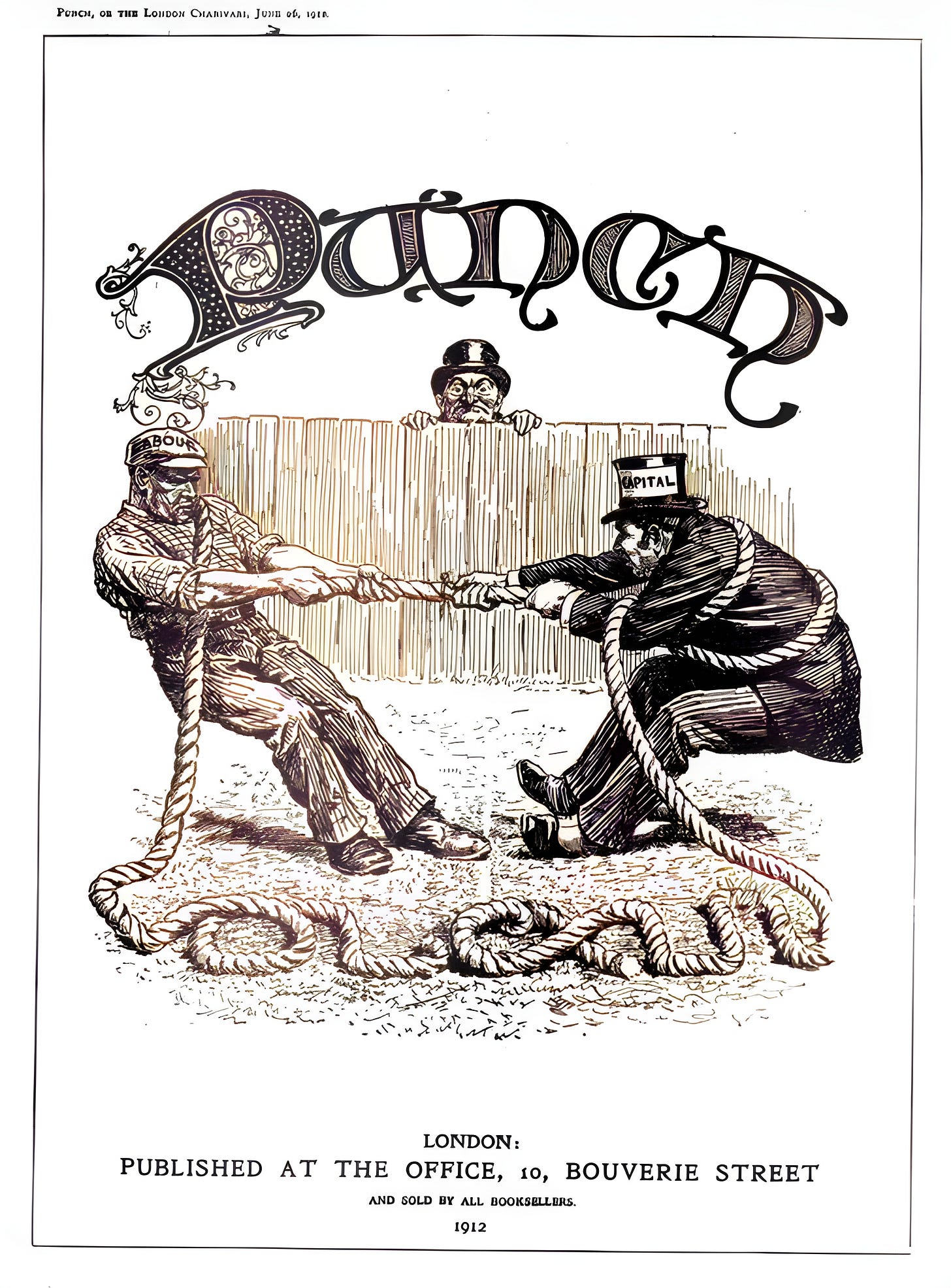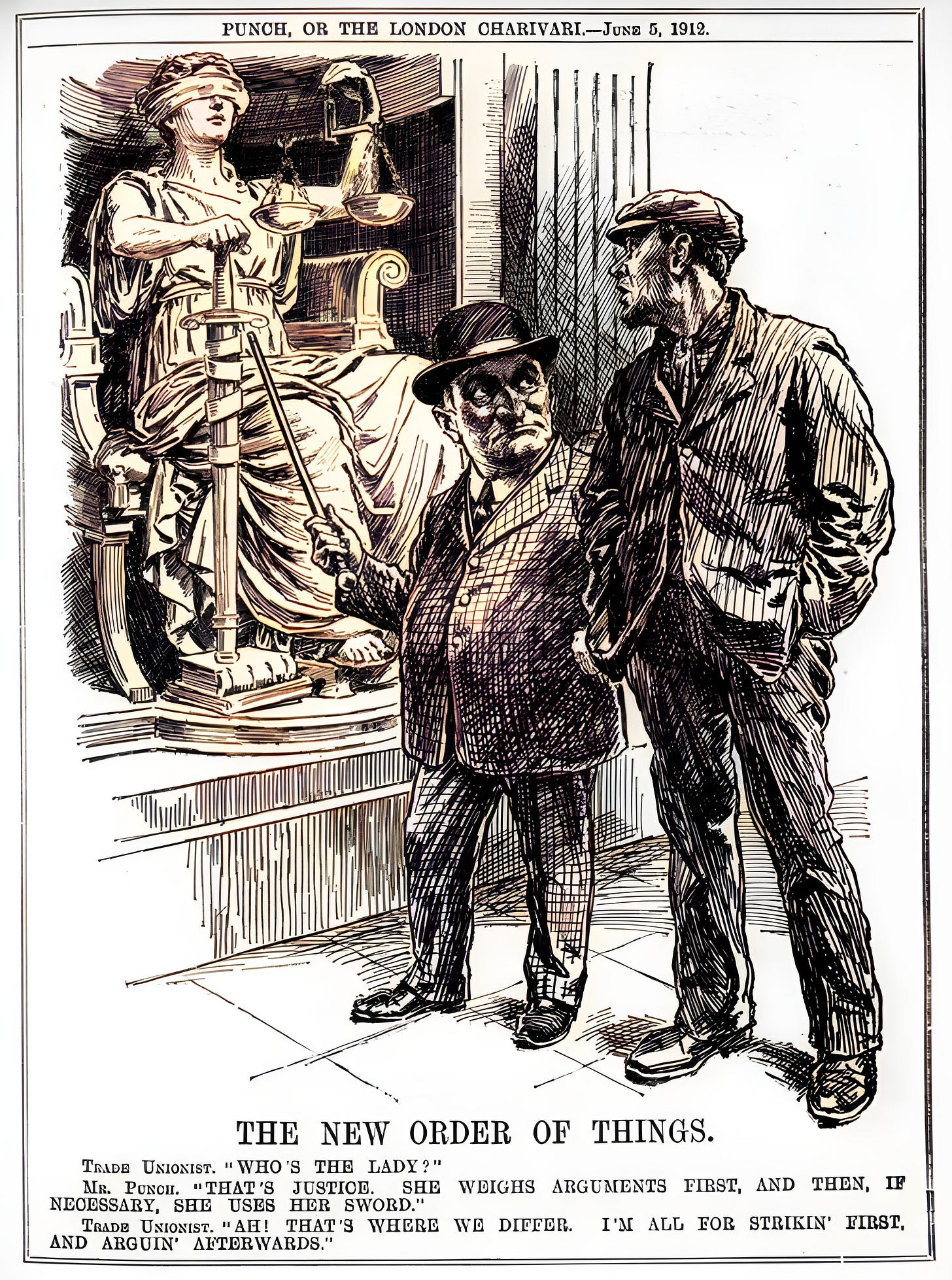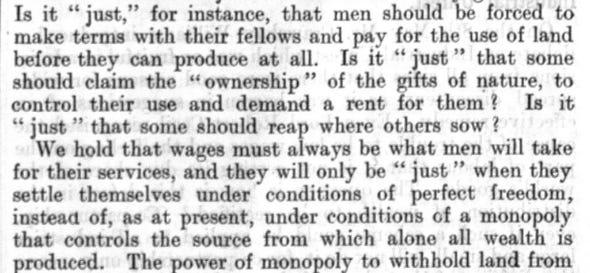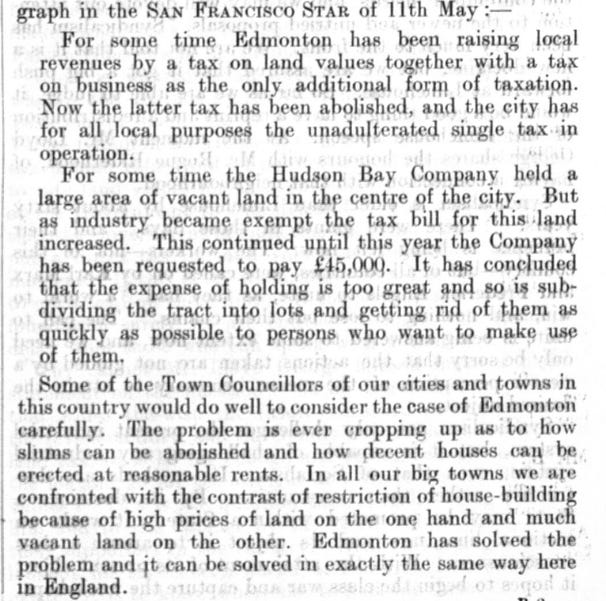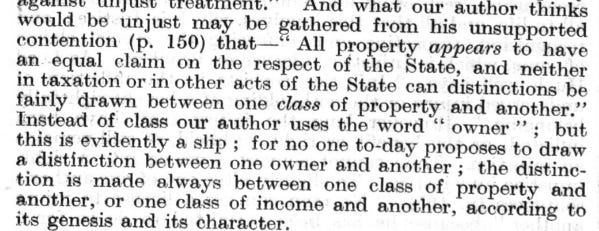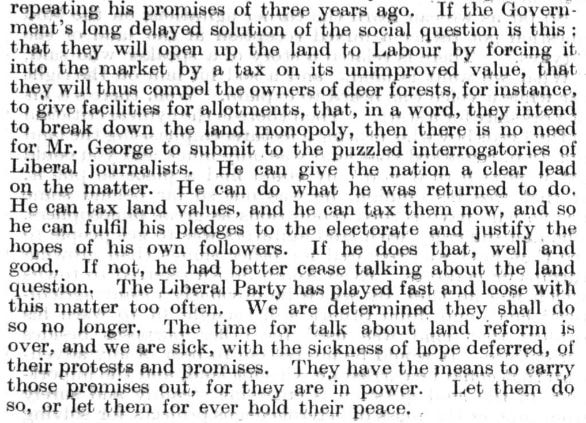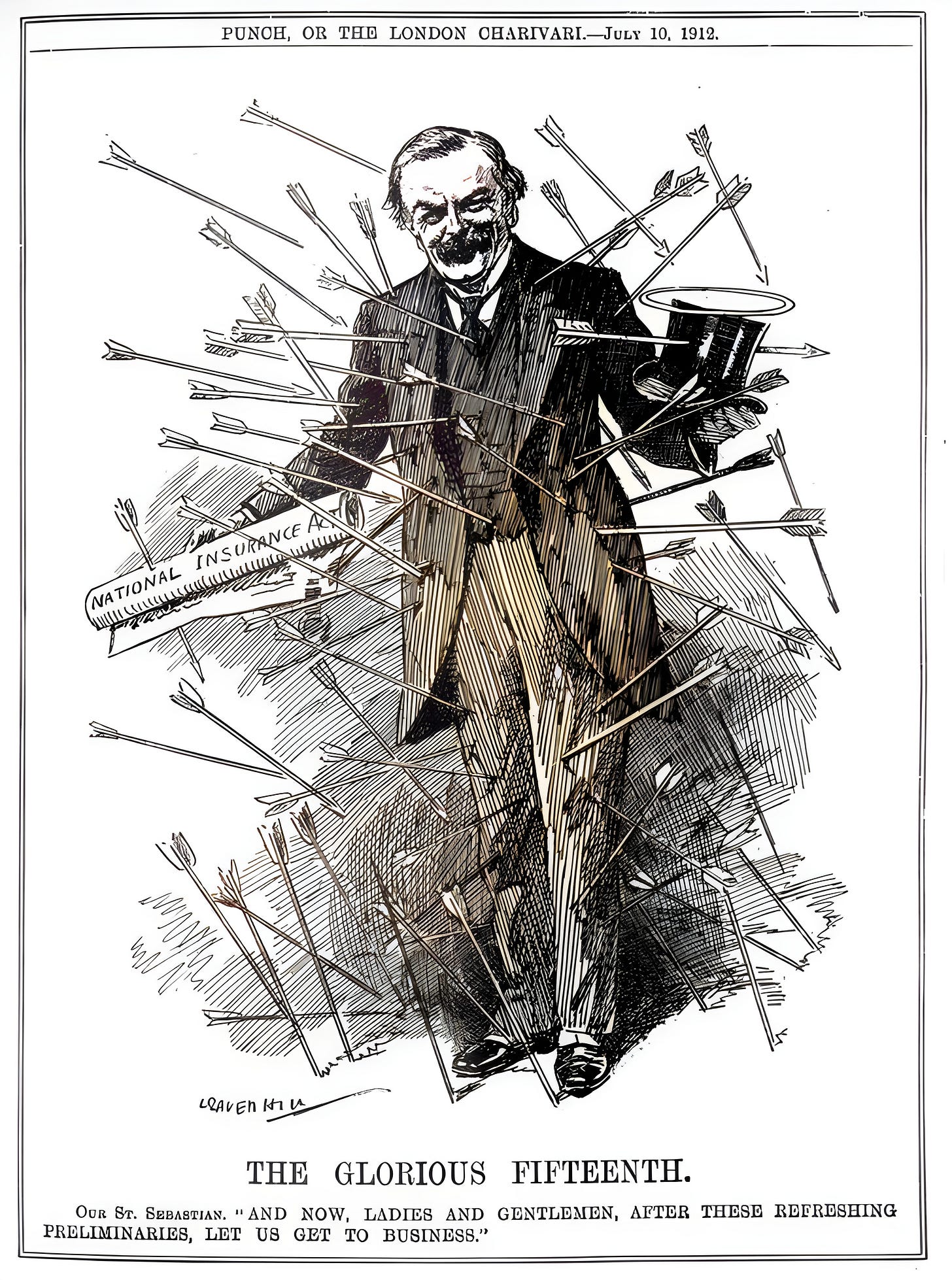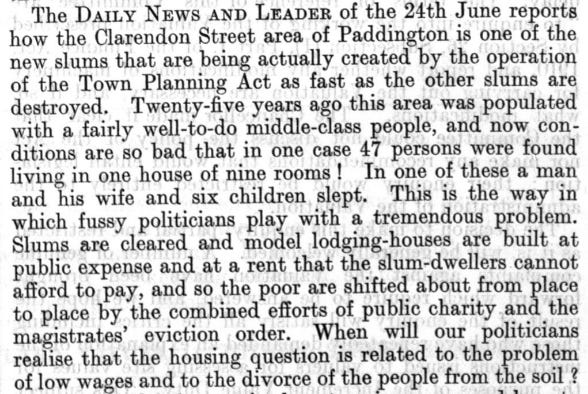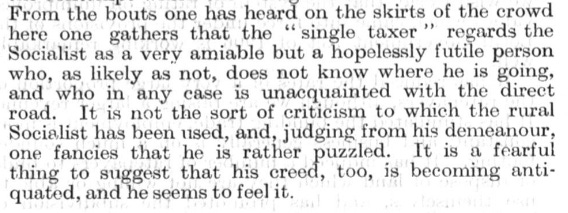The Single Tax v World War One (13) June-July 1912
“Throw both charity and eugenics out of the window”: Advanced Liberalism makes its play
Who is that between Labour and Capital?
1912 - the grassroots Land Campaign launches a major offensive
Questions are asked in the House:
Some of the key campaigners - Robert Outhwaite in particular - were Land Values staffers.
Land Values - nineteen years old
“We hold that wages must always be what men will take for their services, and they will only be ‘just’ when they settle themselves under conditions of perfect freedom, instead of, as at present, under conditions of a monopoly”
“the ownership of land gives to the owners a constantly increasing share of the wealth”
“Landowners live as parasites upon industry”
Parliamentary debate on the Valuation
Edmonton, Canada: the Single Tax functioning as designed
Lloyd George on the land question and icebergs
The Liberals: shipwrecked on the land question
Lloyd George: “Take the land question. Every Liberal tells you that it is the root of everything, but up to the present we have just dealt with it as if we were handling a hedgehog”
“the demand for a minimum wage is shaking the foundations of industry”
“Our workpeople are reading not newspapers only, but even books on economics. It is the new knowledge that makes the difference.”
Daily Herald: “It was largely upon land reform that the Liberal Party won their tremendous, their unprecedented victory of 1906”
“Land reform, or what looked like it, saved the Liberals again in 1909”
“and land reform again in was (not Insurance nor Welsh Disestablishment nor even Home Rule) that sent the Party back to office a third time with a mandate to smash the Veto of the Peers”
“we are sick, with the sickness of hope deferred”
The dimensions of “The Great Unrest”
War strategists recognised that a war could be made impossible by mass strikes. (What specific changes in mass consciousness had occurred to make that a possibility?)
“Nor has this unrest been confined to this country.
Wherever we look over the civilised world we find a state of uneasiness existing in the labour world. Every day we hear tidings from America, or France, or Germany, of new tumults in industry, and this unrest is not only unprecedented but it is ubiquitous.”
“Not only has labour learnt its power, but labour has obtained an ethical conviction of the rights of its cause.”
Industrial unrest, the mainstream view: “the cause of it all is civilisation itself … there is no humanity in industry, there are no bonds between workmes and employers”
Industrial unrest, inspired by: “a great influx of cheap literature of the very best quality”
Scattered through this series is evidence of the size of the leafletting campaign. This campaign was decades old. Politics and mainstream debate had a Georgist (Geoist) dimension. For example, refer to the number of famous writers commenting on or connected to land reform, also featured.
“a crisis of enorous importance and tremendous seriousness”
Keir Hardie (Labour): Single Taxer or Socialist?
Keir Hardie was a Single Taxer when he formed the Labour party in 1900. He was then faced with the question of whether a pro-Single Tax Labour party was in any way different to the Liberal party in land tax mode. The Single Tax many held, showed that Socialism was an unnecessary and stifling over-reach. Socialism sides with big government, the Single Tax resists it: in reducing the monopoly on land it reduces the monopoly on violence. It did not survive: the First World War was an emphatic victory for Statism. In 1912 it was a race between the Single Tax and State-centrally-driven mass-scale industrial war.
Lloyd George declines the opportunity to spout Georgism
“A number of genuine complaints against the Valuation have been brought forward which require to be answered”
“Those who would take part in the struggle must definitely choose their sides.”
“throw both charity and eugenics out of the window”
“We suggest to Prime Minister Asquith that it the constant, automatic addition of rent or value that is the bottom cause of labour unrest.”
“It is impossible to isolate these two problems of Land and Labour”
“It is this private tax of the landlord on the land which the ‘Radicals’ object to”
“the greatest burden on the land - the landlord”
“only by way of the Land Value Taxation philosophy can the Liberal Party be indoctrinated anew with Liberalism”
“Meanwhile, the ‘single-tax’ disciples of Henry George are carrying on a ‘raging, tearing propaganda’”
“They are openly claiming the NW Norfolk election as a victory for their cause”
“Mr Norton attacks the whole hoggers. but it is plain that Mr Lloyd George’s difficulty is with the hedgehogger.”
“NW Norfolk was an open fight and the victory made quite plain to those with eyes to see and ears to hear.”
“This raging, tearing propaganda has been proceeding for quite a generation”
“Mr Norton refers to our ‘lavish promise of work for all’.”
“The single tax is but an instrument fashioned by the circumstances of our social life to undo the great wrong which is responsible for idle hands, for idle acres, for undeserved poverty.”
“It is not so much what monopoly takes from the citizens as what it absolutely withholds that makes reality fall so tragically short of possibility.”
Land monopoly - root of the Eugenics movement
NW Norfolk: Edward Hemmerde’s Single Tax by-election victory
“Mr Hemmerde fought on the land question”
1912 North West Norfolk by-election
Hemmerde was a fanatical advocate of a Single tax system, based on a Land Value tax, and he made this issue the centre of his campaign. He argued that a Land Value tax meant "raising wages and solving the rural housing problem". He endorsed the programme of the National Agricultural Labourers and Rural Workers Union, which called for Trade Boards to set agricultural wages. A Land Value tax was not Liberal Party policy, but Liberal Chancellor of the Exchequer David Lloyd George, sent Hemmerde a message of support in which he agreed to "a thorough reorganization of the land system".
The result brought the issue of Land Value taxation to the fore of Liberal government thinking. Lloyd George sat down with Hemmerde and the Single Taxers to devise new land policies to present to the electors at the next general election.
A general election was due to take place by the end of 1915. However, due to the outbreak of World War I, the election did not take place.
The Single Taxers and the Future of Liberalism 1906-14
THE sTRanGE casE of EDWaRD HEmmERDE
Journal of Liberal History 69 Winter 2010–11
‘The Outhwaite controversy’: a micro-history of the Edwardian land campaign
Brian Short, Journal of Historical Geography January 2007
The Single Tax revolution: battered and bruised, but back
Hemmerde on why he won
“the victory of 1906 was largely due to the ceaseless advocacy of the positive side of Free Trade, known as the Taxation of Land Values”
1916: “When this Valuation is completed the ground will be cleared for an advance.”
“The industrial problem of to-day is one which no Minimum Wage Act will solve.”
“It can be solved in only one way, and that is, by raising the wage of labour at the primary source of employment.”
“The effect of Land Values Taxation is no matter of theory.”
A Single Taxer MP’s forecast for 1914:
“The ground will then be clear for a great advance into the territory of Social Reform.”
“That is the question fraught with the deepest significance for the Liberal Party.”
“Let the Liberal Party take up the Land question in the spirit which actuated Cobden and Bright and it has nothing to fear from Toryism or Socialism. Let it play with the question and it ceases to be a living and active force in our political world.”
The Single Tax: “advanced Liberalism”
“The land policy of the new Member caught on like wildfire.”
“What affected the electors generally was that at long last land reform was becoming practical politics.”
The reason for the pre-war land sell off




